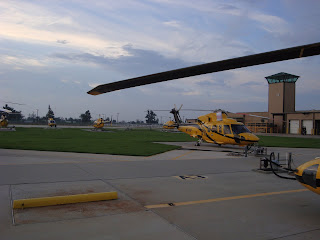For the offshore helicopter pilot, hurricane
evacs can be strange. There's the intensity of the evacuation, with some pilots facing multiple flights and long hours. Then comes the evacuation of the helicopters. Then comes the waiting, in safe havens such as Tallahassee, Florida, or
Dothan, Alabama. Then comes the
remobilization, which tends to seem nearly as urgent as the evacuation, with more days of multiple flights and long hours.
I was working out of my employer's
Boothville, Louisiana base when the evacuation started.
Boothville happens to be the spot where Katrina made landfall three years ago. It's safe to say that during the Area Manager's briefing on the morning of the helicopter evacuation, there was tension in the air.

A portion of the
Boothville heliport's parking lot, empty. All of our passengers offshore have been evacuated; all of the employee vehicles have been moved to safer ground north of New Orleans.

I snapped this shot shortly before we began our flight to the safe haven of Tallahassee. I wondered what the heliport would look like in a couple of days.

The first portion of our escape flight was over the Gulf of Mexico. Here, an offshore oil
workboat is on the run to the east, away from Gustav's path.

The Tallahassee newspaper reported that PHI repositioned twenty-two aircraft to that city as a safe haven.
Tomorrow, we'll likely reposition to a base other than
Boothville, perhaps in Alabama. The initial report we've heard is that
Boothville did not suffer major damage, but that it will take time to clean it up and make it an operational base again. Oh yeah, and then there are little details like power, water, and sewage.
It was fun to get together with old friends for dinner, to swap stories and lies, to experience the
camaraderie that comes with pulling off a hurricane evacuation. Soon, it will be time to fly the workers offshore, to get the oil flowing again. Soon, we'll be pilots again, facing the Gulf of Mexico every morning, instead of running from it.










